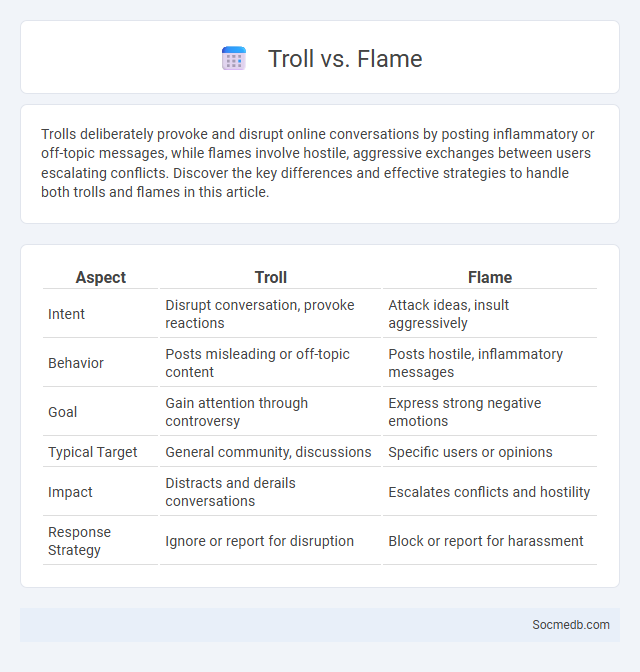
Photo illustration: Troll vs Flame
Trolls deliberately provoke and disrupt online conversations by posting inflammatory or off-topic messages, while flames involve hostile, aggressive exchanges between users escalating conflicts. Discover the key differences and effective strategies to handle both trolls and flames in this article.
Table of Comparison
| Aspect | Troll | Flame |
|---|---|---|
| Intent | Disrupt conversation, provoke reactions | Attack ideas, insult aggressively |
| Behavior | Posts misleading or off-topic content | Posts hostile, inflammatory messages |
| Goal | Gain attention through controversy | Express strong negative emotions |
| Typical Target | General community, discussions | Specific users or opinions |
| Impact | Distracts and derails conversations | Escalates conflicts and hostility |
| Response Strategy | Ignore or report for disruption | Block or report for harassment |
Understanding Trolls: Definition and Characteristics
Trolls are individuals who deliberately provoke and disrupt online conversations by posting inflammatory, irrelevant, or offensive comments on social media platforms. Their primary goal is to elicit emotional responses or derail discussions, affecting the overall user experience. Understanding the tactics and behaviors of trolls can help you better manage and respond to negative interactions in digital communities.
What is a Flame? Key Features Explained
A flame on social media refers to a hostile or insulting interaction designed to provoke emotional responses or arguments. Key features include aggressive language, personal attacks, and an intent to escalate conflict within online communities. Flames often disrupt constructive communication, leading to toxic environments across platforms like Twitter, Facebook, and Reddit.
Troll vs Flame: Main Differences
Trolls disrupt online conversations by posting provocative or off-topic messages to provoke emotional responses or derail discussions. Flames involve aggressive and hostile messages directly targeted at individuals, aiming to insult or attack. Understanding these differences helps you navigate social media more effectively by recognizing intent and choosing how to respond.
Types of Trolls in Online Communities
Types of trolls in online communities include the classic troll who provokes others with inflammatory comments, the concern troll who pretends to support while subtly criticizing, and the baiter who deliberately posts controversial content to elicit strong emotional reactions. Other forms are the impersonator troll that adopts fake identities to deceive community members and the grief troll who targets individuals to cause emotional distress. Recognizing these distinct trolling behaviors helps moderators implement effective strategies to maintain a healthy and respectful online environment.
Psychological Motivation Behind Trolling and Flaming
Social media environments often trigger trolling and flaming due to psychological motivations such as the desire for attention, power, and social dominance. Anonymity and reduced social accountability on platforms like Twitter and Reddit amplify aggressive behaviors driven by frustration and the need for self-expression. Understanding these motives is crucial for developing effective moderation strategies and promoting healthier online interactions.
Recognizing a Troll vs a Flamer
Recognizing a troll involves identifying users who deliberately provoke or disrupt conversations by posting inflammatory or off-topic messages to elicit emotional responses. A flamer, in contrast, aggressively attacks others with hostile language but often in reaction to specific content or disagreements. Understanding these distinctions helps you navigate social media more effectively, protecting your interactions from unnecessary conflict.
Impact of Trolling and Flaming on Online Discourse
Trolling and flaming significantly degrade the quality of online discourse by fostering hostility and reducing constructive conversations on social media platforms. These disruptive behaviors increase polarization and discourage meaningful engagement, impacting Your ability to exchange ideas and build communities. Addressing such toxic interactions is essential to promote healthier, more respectful digital environments.
Strategies to Respond to Trolls and Flamers
Effective strategies to respond to trolls and flamers on social media include maintaining a calm and professional tone while avoiding emotional engagement that fuels conflict. Employing moderation tools such as comment filters, blocking, and reporting mechanisms helps manage disruptive behavior efficiently. Establishing clear community guidelines and consistently enforcing them creates a respectful environment that deters trolling and flaming activities.
Prevention and Moderation: Managing Toxic Behaviors
Effective prevention and moderation of toxic behaviors on social media require implementing real-time content filters and AI-powered sentiment analysis to detect harmful language before it spreads. Your platform can benefit from establishing clear community guidelines and employing trained moderators to ensure timely intervention and user accountability. Leveraging user reporting systems alongside behavioral analytics helps maintain a safe environment that promotes positive interactions.
Future Trends: Evolving Nature of Trolling and Flaming
The future of social media reveals an evolving nature of trolling and flaming, characterized by more sophisticated and targeted attacks using AI-driven tools and deepfake technology. Platforms are increasingly employing advanced algorithms and machine learning to detect and mitigate harmful behaviors, yet the tactics used by trolls adapt rapidly, exploiting new vulnerabilities in communication channels. Understanding these dynamics is crucial for protecting your online presence and fostering safer digital communities.
 socmedb.com
socmedb.com